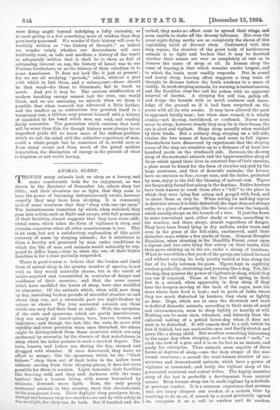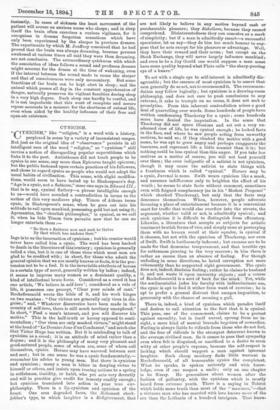ANIMAL SLEEP.
THOUGH many animals look on sleep as a luxury, and make comfortable beds for its enjoyment, as was sown in the Spectator of December 1st, others sleep but little ; and their slumbers are so light, that they seem to have the power of becoming instantaneously awake, however soundly they may have been sleeping. It is commonly said of some creatures that they "sleep with one eye open." The instantaneous transition by which, when wakened, they pass into action, such as flight and escape, with full possession ei their faculties, almost suggests that they have some addi- tional sense, which takes the form of vigilance in sleep, and remains conscious when all other consciousness is lost. This is an easy, but not a satisfactory, explanation of this quick ,recovery of sense by sleeping animals ; for it attributes to them a faculty not possessed by man, under conditions in which the life of men and animals would naturally be sup- posed to differ least,—that is, when the use of their higher faculties is for a time partially suspended.
There is good reason to believe that the broken and timid farm of animal sleep in the greater number of species, is not such as they would naturally choose, but is the result of habits acquired and transmitted in centuries of danger and avoidance of their enemies ; and that the same causes which have modified the hours of sleep, have also modified its character. Of the animals which, when wild, now sleep by day, snatching broken periods of unrestful slumber as and where they can, not a twentieth part are night-feeders by nature or choice. The true nocturnal animals are those which can only find their food at night. With the exception A the owls and opossums, which are partly insectivorous, they are nearly all insect-eaters, bate, lemurs, 'wises, and nightiars; and though the last, like the owls, do move with rapidity and some precision when once disturbed, the others aught be distinguished from those creatures which are only nectarnal by necessity, by the absence of that wakefulness in bleep which the latter possess in such a marked degree. The bats, Lemurs, and lorisee are, during the day, steeped and dragged with slumber. If once discovered, they make no effort to escape ; like the opossums, which let the "black Mows" chop them out of their holes in the hollow trees without moving from their sleeping-places, it does not seem peseible for them to awaken. Light benumbs their faculties Like freezing cold, and they seek darkness with the same instittet that a human being, with senses benumbed by sickaess, demands more light. Bats, the only purely ciontarnal animals in this country, show this characteristic traits completest form. Their daylight sleep paralyses them, theatg-k not because they are unable to sec and fly with safety in the aanl,;ght, for they can do both. But if handled and dis- turbed, they make no effort even to spread their wings, and seem unable to shake off the drowsy influence. Not wean the great night-flying moths are so completely the slaves of this anyielding habit of diurnal sleep. Contrasted with this deep repose, the slumber of the great body of herbivorous animals is so light and broken that it may be doubted whether their senses are ever so completely at rest as to deserve the name of sleep at all. In human sleep the sense of hearing is that which remains awake longest, and to which the brain most readily responds. But in sound and heavy sleep, hearing often suggests a long train of thought in dreams before the brain awakens to a sense of reality. In most sleeping animals, its warning is instantaneous, and the faculties obey the call for action with no apparent interval of inertia. A sleeping fox will rise, gallop off, and dodge the hounds with as much coolness and know- ledge of the ground as if it had been surprised on the prowl with all its wits awake. It may have allowed the pack to approach fatally near ; but when once roused, it is wholly awake,—not drowsy, bewildered, or confused. Hares seem never to sleep; however closely they may lie in their forms, the eye is alert and vigilant. Stags sleep soundly when watched by their hinds. Bat a solitary stag, sleeping on a hill-side, retains the two senses of hearing and scent in full vigour. Deerstalkers have discovered by experiment that the sleeping senses of the stag are sensitive up to a distance of at least two hundred yards on the windward aide. Between the drowsy sleep of the nocturnal animals and the hyper-sensitive sleep of those which spend their lives in constant fear of their enemies, a place must be found for the form of slumber enjoyed by the large carnivore, and that of domestic animals ; the former have no enemies to fear, except man, and the latter, protected by man, enjoy to the full the blessing of natural rest. Tigers are frequently found fast asleep in the daytime. Native hunters have been known to track them after a " kill " to the place in which they were lying fast asleep and gorged with food, and to shoot them as they lie. When taking its mid-day repose in districts where it is little disturbed, the tiger does not always retire to a place of security, like the bear, or even the leopard, which usually sleeps on the branch of a tree. It just lies down in some convenient spot, either shady or warm, according to the weather, and there sleeps, almost regardless of danger. They have been found lying in dry nullahs, under trees, and even in the grass of the hill-sides, unobserved, until their disturber came within a few yards of them. General Douglas Hamilton, when shooting in the Dandilly Forest, came upon a tigress and two cabs lying fast asleep on their backs, with their paws sticking up in the air, under a clump of bamboos. When he was within a few yards of the group, one raised its head and without moving its body quietly looked at him along the line of its body between its paws. Tigers kept in captivity, awaken gradually, stretching and yawning like a dog. Yet, like the dog, they possess the power of vigilance in sleep, which they can use if required. Those at the Zoo will spring to their feet in a second, when apparently in deep sleep, if they hear the keepers moving at the back of the cages, near the store where their food is kept ; and in parts of India where they are much disturbed by hunters, they sleep as lightly as deer. Dogs, which are at once the drowsiest and most wakeful of domestic animals, according to their state of mind and circumstances, seem to sleep lightly or heavily at will. Nothing can be more slow, reluctant, and leisurely than the enforced waking of a petted house-dog when it does not wish to be disturbed. It will remain deaf to a call, twitch its feet if tickled, but not unclose its eyes, and finally stretch and yawn like a sleepy child. But mention something interesting to the same dog when sleeping, such as the word " walk," or click the lock of a gun, and it is on its feet in an instant, and ready- for enterprise. Thus animals seem capable of three forms or degrees of sleep,—one the deep stupor of the noc- turnal creatures ; a second the semi-human slumber of car- nivorous and domesticated animals, which have a power of vigilance at command ; and lastly the vigilant sleep of the prsecuted ruminant and rodent tribes. The highly sensitive sleep of the last is probably a development from natural causes. Even human sleep can be made vigilant by solicitude or previous resolve. It is a common experience that persona who are heavy sleepers can awaken at a certain hour by resolving to do so, or, if roused by a sound previously agreed on, recognise it as a call to awaken and do awaken instantly. In eases of sicknese the least movement of the patient will arouse an anxious nurse who sleeps; and in sleep itself the brain often exercises a curious vigilance, for it recognises in dreams forgotten sensations which have only been experienced by the sleeper in previous dreams. The experiments by which X Jouffroy conceived that he had proved that the brain was always dreaming, because persons awakened at various times all said they were then dreaming, are not conclusive. The extraordinary quickness with which the association of ideas follows a sound and produces dreams might account for the dream at the time of wakening, even if the interval between the sound made to rouse the sleeper and that of consciousness were only momentary. But some functions of the brain can be kept alert in sleep ; and the animal which passes all day in the constant apprehension of danger, naturally preserves its vigilant faculties daring sleep in a very high degree. Such sleep can hardly be restful, and it is not improbable that this want of complete and secure repose accounts in a measure for the shortness of animal life, even when aided by the healthy influence of their free and open-air existence.









































 Previous page
Previous page